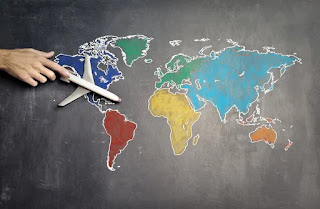Travel is defined as moving from one place to another, moving or migrating, and it has other terms that express it, and it changes that you may have to escape from stress, work, anxiety, marriage, crises and pleasure.
Reasons to travel
Entertaining oneself in the sense of breaking the routine of life with a new adventure.
Eating new foods with the most delicious dishes that are included in the culture of other peoples, and enjoying their arts because they express people.
Getting to know new people, which helps to open up the person to his universality, to his cosmopolitanism.
To get to know countries, and to give him new information that the pictures did not provide him with geographical stereotype in his country.
The benefits of travel:
Improving psychological and mental health, entertaining oneself, and benefits for humans, in order to ward off problems caused by anxiety and tension.
Gaining new energy of faith by walking and hiking in the markets, gardens, streets and parks, in a way that enhances the effectiveness of the body to work again and feel pleasure and happiness.
Improving communication skills with others, especially in the world of communication and technology, as the world has become a small village with the Internet.
Travel helps to strengthen personality and self-confidence, as the traveler gets a sense of tolerance and transfers all cultures to his credit. Even if he does not master the language of a foreign country, through its music and traditional industry, he can look at the history, culture and customs of this country and transfer them to his country of origin. As did the travelers: Vasco de Gama: is one of the most successful Portuguese explorers in the era of European exploration. He was the first person to travel from Europe to India by sea. He was born in 1469 in Portugal, and Christopher Columbus: An Italian traveler who discovered North America on a traveling trip he made across the Atlantic Ocean until he reached the Caribbean islands.
4. Travel etiquette
Learn some foreign words in other countries.
Make sure to express with gestures, as some of them may be misunderstood.
Keep using tortured words and avoid words.
Respect for the local rituals, customs and traditions of other countries and their feelings and religion.
Find enough information for the country you're traveling to Ensure that all documents and supporting documents are brought to be presented at the land, air and sea borders.
Sit politely in the means of transport and not put legs on the seats in the means of transport.
Respect and punctuality.
Bring a set of first aid kits.
5. Travel Means:
- Walking: It is the cheapest and easiest way because it consumes energy and allows the traveler to walk around and see landscapes and geometric shapes, but it is not suitable for remote places.
- Car: As for the car, whether private or rented, it reduces the hardship of travel, and precautions must be taken and monitored to avoid traffic accidents.
- The train: The train is characterized by its safety and speed, and the landscape can be symmetrical through it. Reading books and music and listening to music is comfortable, and accidents are almost non-existent, unlike the car.
- Boat: There are boats in some countries as one of the means of transportation. The oceans and seas surround them, and in their advantages, one of their advantages is enjoying the views of the sea and its grandeur.
- Airplane: It is one of the fastest ways and means, as it is comfortable and safe, saving time for the traveler and at the same time providing him with enjoying the views of the earth at high altitudes.




Comments
Post a Comment